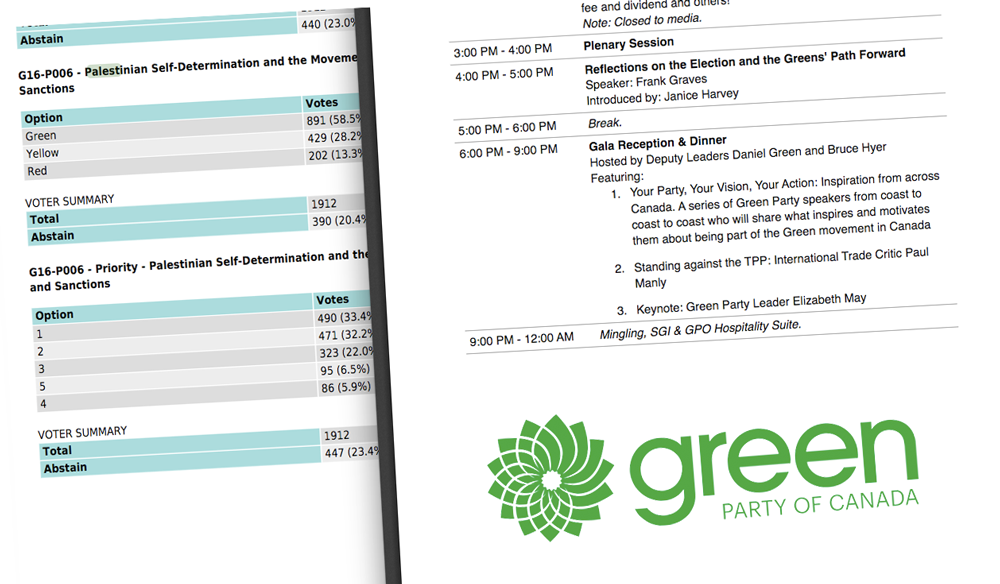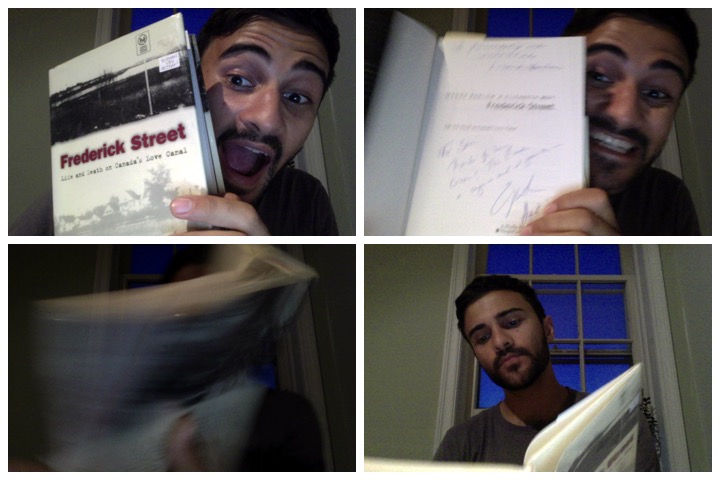
Reflections on the 2016 Green Party Convention
Last weekend, I spent three days in Ottawa's downtown Delta hotel running on adrenaline and idealism. I was socially, mentally, and intellectually exhausted by the time Julia and I left town on the VIA train Monday morning. And I don't regret it for a second.
I helped out with the Green Party's election campaign last summer, and by the time it was all over I had got myself appointed Communications Chair of the Kitchener Centre riding association. I've always resonated with Green policy, and Elizabeth May is a powerhouse speaker. I ended up meeting her, and she signed my copy of Frederick Street, a book my father gave me years ago that Elizabeth May co-wrote back when she was with the Sierra Club.

The thing I love most about the Greens as a political party, is its non-hierarchical structure. Elizabeth May is technically our "Chief Spokesperson", not a top-down authority figure. In an election, she doesn't hold a veto over individual ridings' candidate nominations. If someone wants to propose a policy at Convention, all they have to do is gather 20 signatures. And we use a consensus-based decisionmaking model.
Coming out of the Convention, media across the country pounced on our adoption of a motion supporting the Boycott, Divestment and Sanctions (BDS) movement. The main narrative is that our party is facing an identity crisis: Elizabeth May doesn't agree with the policy and there are calls from media figures for her to step down.
The most honourable thing for @ElizabethMay to do is resign. #cdnpoli https://t.co/oySCJ5EGd9
— Warren Kinsella (@kinsellawarren) August 9, 2016
But let's back up for a minute. Remember that consensus-based decisionmaking model?
Yeah, we ditched it as soon as the General Meeting opened on Friday.
The writing was on the wall as 300 mostly-inexperienced Green Party members registered in the Delta lobby. We were given a lanyard and two voting cards: green for yes, red for no. Now that I've read our Rules of Procedure a little more closely, it looks like we should have been given a yellow card to indicate that a motion needs more clarification or information. But there were no yellow cards.
Prior to the General Meeting, there was a half-hour orientation session for new members. It focused almost entirely on the technicalities of Robert's Rules. A member of the executive council told us there was a good chance we would be using Robert's Rules of Order for this Convention. It seemed like a foregone conclusion, and I was trying so hard to keep up with the details that I didn't stop to question the underlying assumptions of it all.
The General Meeting opened, and one of the first motions was to use Robert's Rules in place of our usual procedures. Elizabeth May spoke up against it. She mentioned our principles of cooperation and respect, and didn't feel comfortable using such an adversarial system in our policymaking, where a simple majority of members could force a decision.
Someone else spoke in favour of Robert's Rules, saying they were efficient and clear, and that it would help us get through the dozens of policy motions before us this weekend. Apparently our last convention was a mess, where we ran out of time to vote on everything we were supposed to.
After a short debate, Elizabeth gets back up to the microphone. She says she has changed her mind. She's convinced that Ken Melamed, the Party's President and Chair of the meeting, will do a good job shepherding us all through the technicalities of Robert's Rules. She has a lot of faith in Ken.
And with her blessing, the room moved to approve the motion. We rejected the consensus model.
From then on, the Convention felt like trying to find my balance on a lurching ship. We only had one hour of workshop time to refine the 23 proposals that would be voted on. The two proposals concerning the Israel-Palestine conflict got their own workshop; I chose to attend the only other policy workshop, where we had 7 proposals to consider. We did a pretty terrible job of debating four of them; we didn't have time to get to the remaining three. What more can you expect from a one-hour session?
After an intense and productive day at @CanadianGreens Convention, gala dinner is much needed. #GPConf16 pic.twitter.com/S032gg3TnT
— Dan Palmer (@djtpalmer) August 6, 2016
At the end of the weekend, we passed a lot of great public policy. A hard line on dangerous oil tanker traffic. A targeted tax on sugary drinks to fight diabetes. Universal dental care. These all passed with nary a word of debate, because Green members are in broad agreement on these issues.
For the record, I supported the BDS motion. I also supported the motion to revoke charitable status from organisations that are complicit in human rights violations (I didn't feel comfortable singling out JNF Canada and would have voted against the original wording).
But I also know that these are polarising topics and that there was not a broad consensus in the room. The debate on the BDS motion dragged on and on. Ken Melamed did a great job moderating and giving time to both sides. You could cut the tension in the room with a knife, and I was soon among the chorus of people shouting "Question! Question!", i.e. "Everyone shut up and let's just vote on the question." Everyone knew the debaters were not going to change anyone's mind. We wanted to get this over with so we could focus on other policy matters.
So we got it over with. Using an adversarial, simple-majority decisionmaking model. One that we rushed in at the beginning of the Convention.
If we hadn't adopted Robert's Rules, and if the workshops had been functional, the Green Party would be in a very different place right now.
Oh, and one more thing: at the next Convention, let's open up voting rights to those that don't have the money or free time to spend a weekend in a hotel in a far-flung city. It's not very grassroots of us to limit participation.
Sam NabiThose of us who cannot afford the @canadiangreens convention fee cannot vote on policy. Not #democracy. #GPConf16 pic.twitter.com/OZLPB4GSyX
— Temara Brown (@temarabrown) August 6, 2016
